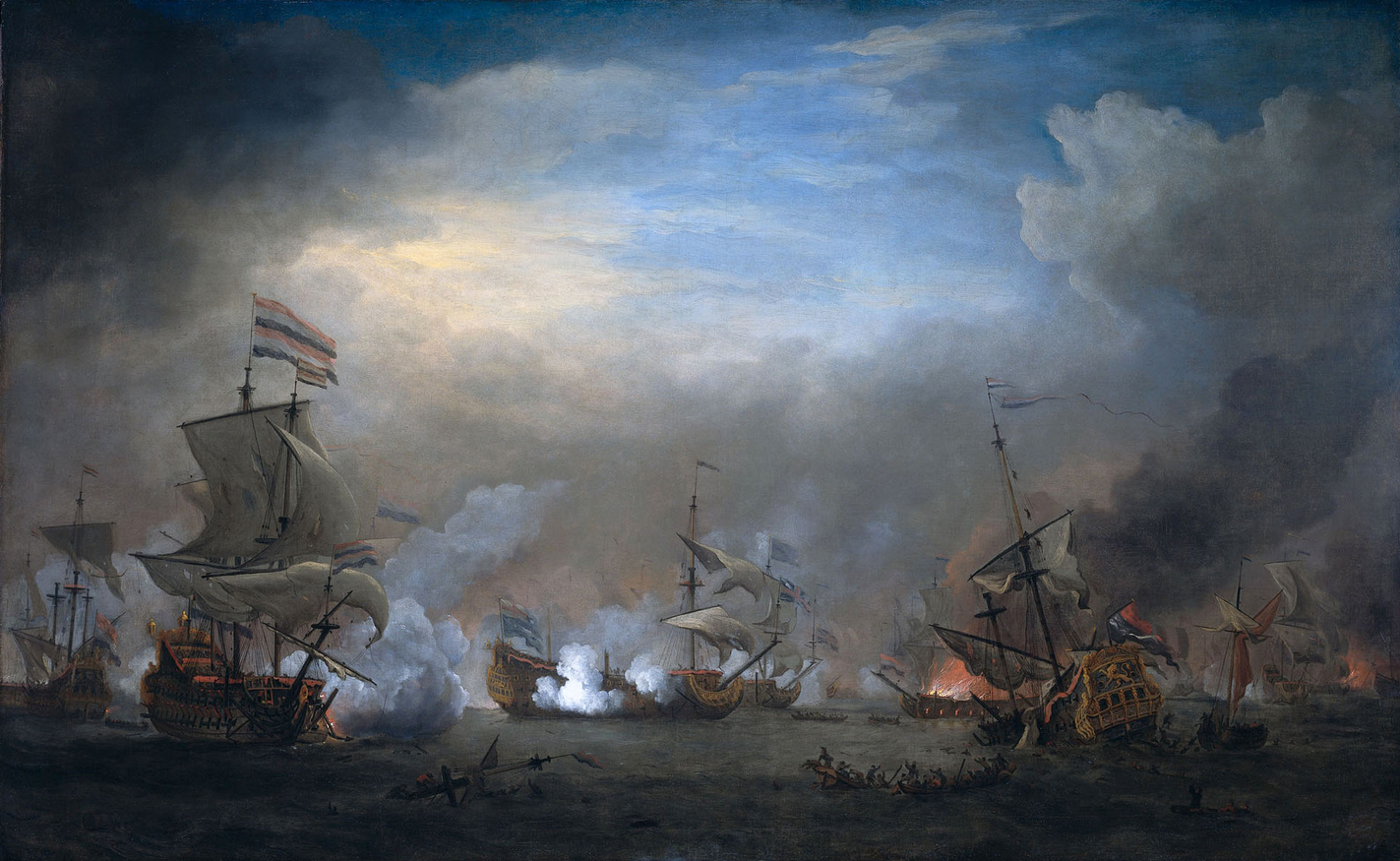Editor’s note: The following is extracted from A History of Sea Power, by William Oliver Stevens and Allan Westcott (published 1920). All spelling in the original.
The Third Dutch War
Less than five years later Charles again made war on the Netherlands. For this there was not the shadow of excuse, but Louis XIV saw fit to attack the Dutch, and Charles was ever his willing vassal. The English began hostilities without any declaration of war by a piratical attack on a Dutch convoy.
At this juncture Holland was reduced to the last extremity. Attacked on her land frontiers by France, then the dominating military power, and on her sea frontiers by England, the strongest naval power, she seemed to have small chance to survive. But her people responded with a heroism worthy of her splendid history. They opened their dykes to check the armies of invasion and strained every nerve to equip a fleet large enough to cope with the combined navies of France and England. In this Third Dutch War four great naval battles were fought: that of Solebay, May 28, 1672, the two engagements off Schooneveldt, May 28 and June 4, 1673, and that of the Texel, August 11, 1673.
In all of these the honors go to the Dutch and their great admiral, de Ruyter. Since these actions did not restore the Netherlands to their old-time position or check the ascendancy of England, they need not be discussed individually here. The outstanding feature of the whole story is the surpassing skill and courage of de Ruyter in the face of overwhelming odds. In this war he showed the full stature of his genius as never before, and won his title as the greatest seaman of the 17th century. After his death one must wait till the day of Suffren and Nelson to find men worthy to rank with him.
In this campaign de Ruyter showed his powers not only as a tactician but as a strategist. In the words of Mahan, the Dutch “made a strategic use of their dangerous coast and shoals, upon which were based their sea operations. To this they were forced by the desperate odds under which they were fighting; but they did not use their shoals as a mere shelter,—the warfare they waged was the defensive-offensive. When the wind was fair for the allies to attack, de Ruyter kept under cover of his islands, or at least on ground where the enemy dared not follow; but when the wind served so that he might attack in his own way he turned and fell upon them.” That is, instead of accepting the tame rôle of a “fleet in being” and hiding in a safe harbor, de Ruyter took and held the sea, always on the aggressive, always alert to catch his enemy in a position of divided forces or exposed flank and strike hard. His master, Martin Tromp, is regarded as the father of the line ahead formation for battle, but he undoubtedly taught de Ruyter its limitations as well as its advantages, and there is no trace of the stupid formalism of the Duke of York’s regulations in de Ruyter’s brilliant work.
At this time he had no worthy opponent. As Monk was dead, the Duke of York had again assumed active command with Rupert as his lieutenant. Although the Duke was honestly devoted to the navy he was dull-witted, and in spite of the advantage of numbers and the dogged courage of officers and men which so often in English history has made up for stupid leadership, he was wholly unable to cope with de Ruyter’s genius. As for the French navy, their ships were superb, the best in Europe, but their officers had no experience and apparently small desire for close fighting. At all events, despite the odds against him, de Ruyter defeated the allies in all four battles, prevented their landing an army of invasion, and broke up their attempt to blockade the coast.

The war was unpopular in England and as it met with ill success it became more so. After the battle of the Texel, in 1673, active operations died down to practically nothing, and at the beginning of the year England made peace. By this time Holland had managed to find other allies on the Continent—Spain and certain German states—and while she had to continue her struggle against Louis XIV by land she was relieved of the menace of her great enemy on the sea. Fifteen years later, by a curious freak of history, a Dutch Page 191 prince became King William III of England, and the two old enemies became united in alliance. But the Netherlands had exhausted themselves by their protracted struggle. They had saved their independence, but after the close of the 17th century they ceased to be a world power of any consequence.
The persistent enmity of the French king for the Dutch gained nothing for France but everything for England. Unwittingly he poured out his resources in money and men to the end that England should become the great colonial and maritime rival of France. As a part of her spoils England had gained New York and New Jersey, thus linking her northern and southern American colonies, and she had taken St. Helena as a base for her East Indies merchantmen. She had tightened her hold in India, and by repeatedly chastising the Barbary pirates had won immunity for her traders in the Mediterranean. At the beginning of the Second Dutch War Monk had said with brutal frankness, “What matters this or that reason? What we want is more of the trade which the Dutch have.” This, the richest prize of all, fell from the hands of the Dutch into those of the English. During the long drawn war which went on after the English peace of 1674, while Holland with her allies fought against Louis XIV, the great bulk of the Dutch carrying trade passed from the Dutch to the English flag. The close of the 17th century, therefore, found England fairly started on her career as an ocean empire, unified by sea power. Her navy, despite the vices it had caught from the Stuart régime, had become firmly established as a permanent institution with a definite organization. By this time every party recognized its essential importance to England’s future.
Nevertheless, whatever satisfaction may be felt by men of English speech in this rapid growth of England’s power and prestige as a result of the three wars with the Dutch, one cannot avoid the other side of the picture. A people small in numbers but great in energy and genius was hounded to the point of extinction by the greed of its powerful neighbors. Peace-loving, asking merely to be let alone, the only crime of the Dutch was to excite the envy of the English and the French.









